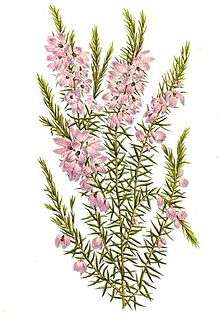Tremandraceae

Tetratheca pilosa
Tremandraceae R. Br. ex DC. is the name of a defunct family of flowering plants. It contained three genera: Platytheca, Tetratheca, and Tremandra. In 2006, a molecular phylogenetic study showed that Tremandraceae is embedded in Elaeocarpaceae. [1] Recognizing Tremandraceae as a separate family would make Elaeocarpaceae paraphyletic.
Tremandraceae was first recognized by Robert Brown in 1814, as Tremandreae, before the suffix - aceae was used to denote plant families. Brown's name was not validly published, but the name was validated by Augustin Pyramus de Candolle in 1824. The name Tremandreae is still sometimes used for this group, but at the taxonomic rank of tribe.
References
- ↑ Darren M. Crayn, Maurizio Rossetto, and David J. Maynard. 2006. "Molecular phylogeny and dating reveals an Oligo-Miocene radiation of dry-adapted shrubs (former Tremandraceae) from rainforest tree progenitors (Elaeocarpaceae) in Australia". American Journal of Botany 93(9):1328-1342.
External links
This article is issued from Wikipedia - version of the Tuesday, October 29, 2013. The text is available under the Creative Commons Attribution/Share Alike but additional terms may apply for the media files.